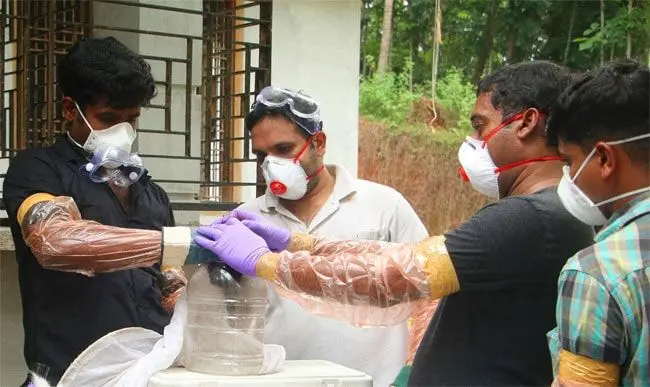Maryland works towards Nipah virus vaccine
06/18/2018| Amanda Winters
Article Topics:
Maryland works towards Nipah virus vaccine
06/18/2018 | Amanda Winters
More than 8,000 miles away, a deadly outbreak is occurring that has already claimed the lives of 17 people. The Nipah virus – which is typically hosted in fruit bats and can spread to people and other animals – is impacting India and quarantining more than 1,000 residents to their homes.
After contracting Nipah virus, symptoms start off as flu-like with headaches and fever, but serious complications can occur including respiratory distress and brain inflammation, potentially leading to seizures or even coma. Currently, there is no known cure for the virus.
Here in Maryland, five organizations and biohealth companies are working to change that. The Henry M. Jackson Foundation for the Advancement of Military Medicine (HJF), the Coalition for Epidemic Preparedness Innovations (CEPI), the Uniformed Services University (USU), Profectus BioSciences, and Emergent BioSolutions are teaming up to develop a human vaccine and stop the virus in its tracks.
Profectus and Emergent have been awarded a $25 million contract from CEPI to combat the spreading disease. The Maryland-made vaccine would work not only on the Nipah virus, but the closely-related Hendra virus, both species of the genus Henipavirus. The treatment is based on technology created more than 15 years ago by members of the microbiology and immunology department at USU.
HJF's Director of Technology Transfer and Commercialization, Mark G. Scher, Ph.D., sat down with MDBizNews to answer a series of questions.
The vaccine is based on virus technology developed by Dr. Christopher Broder and Dr. Katharine Bossart, from the Uniformed Services University of Health Sciences, more than 15 years ago. Are they involved with this new development?
Dr. Broder continues to work with USU and will collaborate developing clinical testing for the Nipah virus vaccine response. Dr. Bossart is the founder and CEO of Integrated Research Associates, LLC, in San Rafael, California, and is no longer directly involved in the project.
How did these five organizations and biohealth companies team up to develop the vaccine?
The vaccine has been tested in multiple preclinical models and recently licensed to Profectus BioSciences by HJF to develop the human version of the vaccine. Dr. Broder began a collaboration with Dr. Antony Dimitrov of Profectus BioSciences to develop the human vaccine with financial support from the U.S. National Institutes of Health several years ago.
As a next step in the Nipah vaccine development program, Dr. Thomas Geisbert, a professor in the Department of Microbiology and Immunology at The University of Texas Medical Branch at Galveston National Laboratory, will conduct studies to evaluate vaccine effectiveness, and HJF, USU, and Profectus will collaborate on the development of clinical testing for the evaluation of the virus vaccine response.
Under the terms of the Framework Partnering Agreement for the collaboration among the three parties, Profectus will receive development funding from CEPI for advancing its Nipah virus vaccine and Emergent BioSolutions will provide technical and manufacturing support for the CEPI-funded program.
Emergent, through a separate agreement with Profectus, has an exclusive option to license and to assume control of development activities for the Nipah virus vaccine from Profectus. The international nonprofit health organization PATH will also be working with the group under a separate agreement with CEPI to conduct human clinical trials.
Was it easy to find the right project partners in Maryland's growing science and technology industry?
Obviously – all of the talent for this collaboration was located within a short distance of each other, which is a credit to the availability of local public-private partnerships, to drive the translation of science from the bench to the bedside.
Can you tell us a little more about the experimental therapy doses that were recently transferred from Australia to India?
Due to the current outbreak, the Indian government requested that the government of Queensland, Australia, send them a supply of the experimental m102.4 human monoclonal antibody, the only known treatment against the virus, for compassionate use. In other words, compassionate use is treating a seriously ill patient using a new, unapproved drug, when no other treatments are available.
The m102.4 antibody producing cell line – developed by Dr. Boder and the USU microbiology department – was previously sent to Queensland after Australian residents were exposed to the Hendra virus, the sister virus to Nipah. Under additional agreements from HJF, Queensland produced the m102.4 and conducted a successful Phase 1 clinical trial showing the safety of the antibody in humans.
After receiving the request from the Indian government, HJF completed agreements with both the governments authorizing the transfer.
What is one thing the rest of the world needs to know about the Nipah virus outbreak?
The biggest issue with the Nipah virus outbreak in India – as well as the 2014 Ebola virus outbreak in Africa – is that the industry has not stepped up to develop the therapeutics and vaccines needed against these deadly threats, as it does not see a market for these products.
However, it is crucial to have stockpiled therapeutics and vaccineswhich is why the CEPI initiative is so important. Hopefully, the industry will see the critical need for these life-saving products for deadly emerging diseases and initiate development programs.
Keep up with the latest.
Sign up for e-mail notifications.
